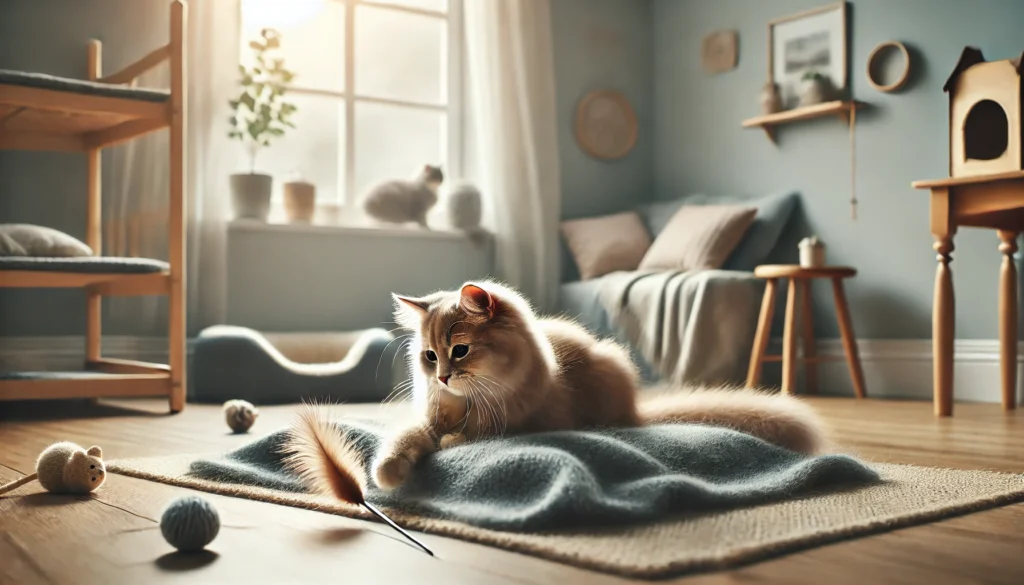Senior cats are often calmer, slower, and more sensitive than younger ones — but that doesn’t mean they don’t need stimulation. In fact, mental and physical enrichment are crucial to keeping older cats happy and healthy. The key is finding the right balance between activity and rest.
Here’s how to keep your senior cat entertained indoors without overwhelming their senses or energy levels.
Understand Your Cat’s Changing Needs
As cats age, their preferences and abilities shift.
- They may not jump as high or run as fast.
- Joints may be stiff or sore, limiting movement.
- Loud noises or fast movements might be stressful.
- They may tire out more quickly, even during play.
Being aware of these changes allows you to choose appropriate enrichment that keeps them engaged — not exhausted.
Use Low-Energy Interactive Toys
Not all toys are created equal — especially for seniors.
- Feather wands moved slowly can engage a cat’s hunting instinct without requiring full sprints.
- Soft crinkle balls or plush mice are easy to bat and carry.
- Use laser pointers with gentle movements, and allow the cat to “catch” a physical toy at the end.
Always stop play before your cat becomes tired or disinterested.
Incorporate Short Play Sessions Throughout the Day
Instead of one long session, try several mini-sessions.
- Aim for 5 to 10 minutes of play, two or three times daily.
- Watch for cues that your cat has had enough (turning away, walking off).
- Keep sessions upbeat but calm — overstimulation can lead to frustration or aggression.
Balance activity with plenty of time to rest and recharge.
Provide Gentle Mental Stimulation
Mental enrichment is just as important as physical activity — and often less taxing.
- Use puzzle feeders or treat-dispensing toys with low resistance.
- Rotate toys every few days to keep interest levels high.
- Hide treats in soft blankets, open boxes, or shallow bowls to encourage gentle foraging.
Engaging the mind helps prevent boredom and supports cognitive health.
Give Access to Window Views
Passive enrichment is great for older cats.
- Set up a cozy perch or hammock near a secure window.
- Let them watch birds, trees, or neighborhood life from a safe spot.
- Add a bird feeder outside the window for entertainment.
Make sure the perch is accessible — use ramps or lower surfaces if jumping is difficult.
Encourage Slow Exploration
Cats love to explore — even if they move more slowly with age.
- Set up cardboard boxes, tunnels, or low shelves for calm exploration.
- Rearrange safe items occasionally to offer new scents and layouts.
- Let your cat lead the pace and duration.
You don’t need fancy gear — just variety and gentle encouragement.
Use Calming Sensory Elements
Support your senior cat’s comfort with a soothing atmosphere.
- Use pheromone diffusers like Feliway to reduce stress.
- Provide soft lighting in play areas to avoid glare.
- Play soft, calming music during play or quiet time.
These elements help your cat stay relaxed and present during activities.
Avoid Overstimulation Triggers
Some cats, especially older ones, are sensitive to sensory overload.
- Avoid rough or fast play that might lead to biting or swatting.
- Don’t overstimulate petting zones like the belly or tail base.
- Use toys instead of hands to redirect excess energy.
Watch your cat’s body language and let them set boundaries.
Provide Restful Environments Between Activities
Recovery is just as important as enrichment.
- Offer quiet beds or padded surfaces in calm, draft-free areas.
- Elevate beds to window level if your cat enjoys watching outside.
- Avoid noise or interruptions during nap times.
Respecting rest helps your cat stay engaged when it’s time for play.
Stay Consistent and Observant
The best entertainment for a senior cat is thoughtful and consistent.
- Keep playtime regular and adjust intensity based on energy levels.
- Rotate new and old toys to avoid overstimulation.
- Stay observant — your cat will tell you when they’re done or want more.
As your cat ages, their needs may change again — stay flexible and responsive.
A Happier, Healthier Life at Every Age
Just because your cat is a senior doesn’t mean playtime is over. In fact, light, well-paced engagement can improve quality of life, prevent boredom, and maintain a strong bond between you and your furry companion.
By tuning into your cat’s preferences and respecting their pace, you’ll create a calm, enriching environment where they can thrive — day by day, year by year.






